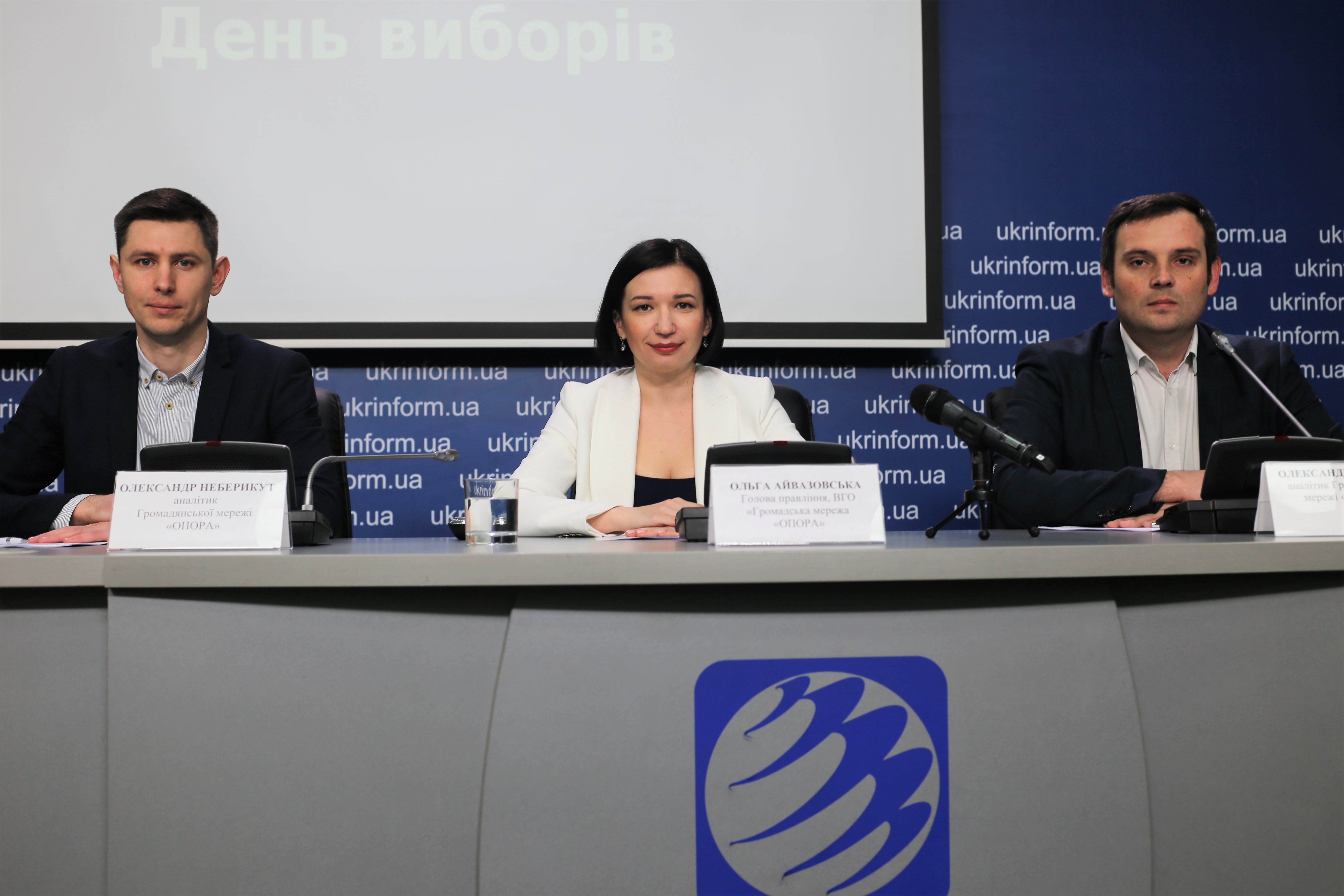OPORA affirms with 99% certainty that results of the second round are the following: Volodymyr Zelenskyi received 73.2% of votes, and Petro Poroshenko – 24.3%. 2.5% of ballots are invalid.
This information was shared on 22 April press-conference by Head of the Board of Civil Network OPORA Olha Aivazovska and OPORA's analysts Oleksandr Kliuzhev and Oleksandr Neberykut.
Civil Network OPORA has organized the parallel vote tabulation based on nationally representative and statistically-based sample. Based on reports from 1299 of 1305 specifically trained and officially registered observers, OPORA affirms with 99% certainty (1299 of 1305 observers at 99.6% of polling stations covering 811,907 votes) that results of the second round of presidential election are the following: Volodymyr Zelenskyi received 73.2% of votes, and Petro Poroshenko – 24.3% (margin of error 1.5%). 2.5% of ballots are invalid (margin of error 0.3%).
Olha Aivazovska informed that the second round was conflict-free and in line with Ukrainian legislation and international democratic standards. There were no significant electoral violations in scale or potential consequences during the second round of voting on 21 April 2019. Although OPORA's observers detected the same types of violations of electoral legislation during the first and the second round vote, the frequency of these violations has decreased.
“Everything went quite well on the Election Day, and the number and types of violations are similar to those detected during the first round. The tendency is positive. The percentage of polling stations, where our observers detected violations, has significantly decreased,” – Olha Aivazovska stated.
“Taking into consideration that the people were regularly informed about violations, particularly voter bribery, on the eve of the second round, our observers haven't noticed any features of such violations or facts that can be brought to the court. This result was reached though efficient prevention of such violations by law-enforcement bodies, and thanks to wide-spread information about possible voter bribery before the first round of voting. Therefore, it's obvious that 21 April elections are mostly in line with international standards,” – she added.
According to interim results of long-term and short-term observation of the regular presidential election in Ukraine (which has been conducted since October 2018), OPORA affirms the election process was competitive. The voting process and pre-election campaign were mostly in line wuth fundamental international standards of democratic elections.
“As for election administration, we assess the election process as adequately administered despite there were serious procedural violations at level of district and precinct election commissions, organizational issues and problems in professional training of commission members at this level,” – Oleksandr Kliuzhev told.
According to Oleksandr Neberykut, attempts to issue or receive ballots without previous passport verification were the most widespread type of violation on the repeated voting.Thus, OPORA's observers detected such violations at 5.5% of polling stations. Such violations were detected at 14.5% of polling stations during the first round of vote. Thanks to OPORA's observers who have promptly responded to such violations, they were prevented in most of the cases. However, illegal practice of voting without documents remains quite widespread.
Candidates used various forms of campaigning, and had sufficient, or even excessive financial resources for this. Although many national and regional mass media demonstrated political sympathies, the citizens were properly informed about activities of candidates for the President of Ukraine, their election programs and political positions. However, unfortunately, candidates for the President of Ukraine participating in the second round have failed to guarantee an adequate discussion of priorities in their election programs on television debates, organized by public TV company at the cost of the State Budget of Ukraine.
According to Ms. Aivazovska, competitiveness of the election was accompanied by significant and systematic defects in the election process. There are still such problems as non-transparent financing of official and indirect campaigning, shadowed financing of campaigning and remuneration of election commission members, misuse of administrative resources and negative information campaigns, which prove it's necessary to strengthen legislative and practical guarantees for democratic elections in Ukraine.
For more information, please contact:
e-mail: [email protected]
Phone: 044 591 44 44
